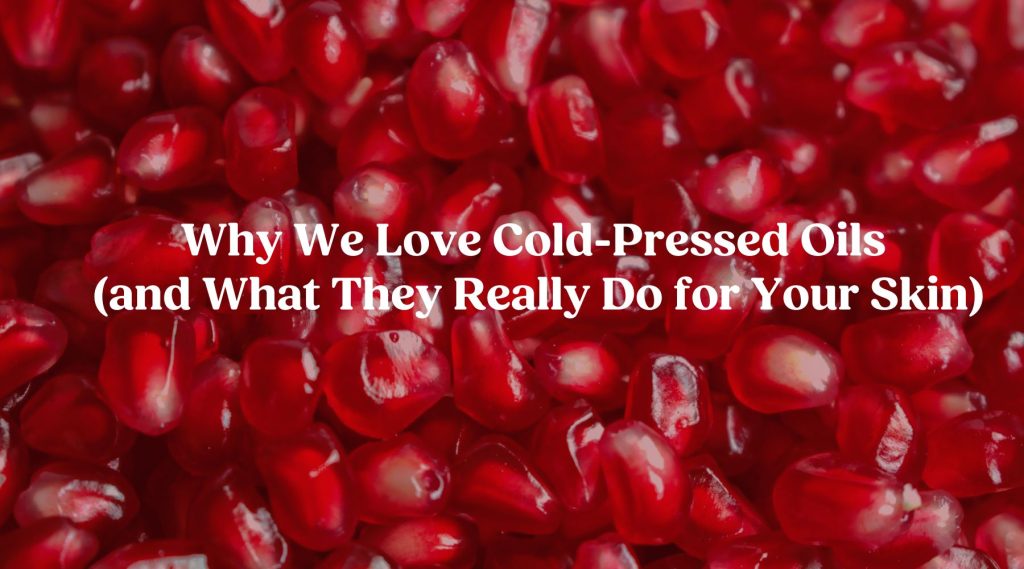
Why We Love Cold-Pressed Oils (and What They Really Do for Your Skin)
For years, skincare marketing told us oils were the enemy—that they clog pores, cause breakouts, and make skin greasy. But when you look at the science, plant oils (especially cold-pressed ones) tell a very different story. They’re some of the most nutrient-dense, skin-supportive ingredients you can use—and when you understand why, it’s hard not to fall in love with them.
What “Cold-Pressed” Really Means
Cold pressing is a gentle extraction method that avoids high heat or chemical solvents. Instead of stripping away nutrients, it preserves them. This means all the delicate compounds—carotenoids, polyphenols, phytosterols (which are realllllly good for your skin)—stay intact.
Think of it like fresh-squeezed juice versus juice from concentrate. Both are “juice,” but one is vibrant, nutrient-rich, and alive in a way the other just isn’t.
Research shows cold-pressed oils contain higher levels of antioxidants and unsaponifiable compounds (like sterols and tocopherols) compared to refined oils, which can lose much of their protective activity during processing .
The Fatty Acids Your Skin Is Craving
At their core, oils are made of triglycerides (fatty acids + glycerol). When you apply them, they form a light, breathable film that reduces water loss. But here’s the deeper layer: enzymes in your skin can break some of those triglycerides down into free fatty acids that play direct roles in barrier repair and cell signaling.
Two fatty acids are especially important:
-
Linoleic acid (omega-6): Strengthens the barrier, helps prevent water loss, and supports healthy cell turnover. Studies show linoleic-rich oils improve barrier repair and calm inflammation .
-
Oleic acid (omega-9): Makes oils feel rich and nourishing but, when used in high amounts, may disrupt barrier lipids for some skin types. That’s why balance matters.
The best cold-pressed oils give you the right mix—supportive but not overwhelming.
Beyond Fat: The Antioxidant Advantage
What makes cold-pressed oils truly special isn’t just the fats—it’s the extras that come along for the ride.
-
Vitamin E (tocopherols, tocotrienols): A powerful antioxidant that protects skin lipids from free-radical damage.
-
Polyphenols: Plant compounds with anti-inflammatory and antimicrobial activity.
-
Phytosterols: Plant sterols that calm irritation and support repair.
-
Carotenoids: Pigments like beta-carotene that have antioxidant and mild UV-protective effects.
One study tested cold-pressed fruit seed oils and found they had strong free-radical scavenging activity, thanks to these antioxidants. Another even suggested some oils may enhance the skin’s natural photoprotection in the near-infrared spectrum .
A Few of Our Favorite Oils
-
Rosehip Seed Oil: High in linoleic and alpha-linolenic acids, plus carotenoids. Great for brightening and supporting uneven tone .
-
Jojoba Oil: Technically a wax ester, almost identical to skin’s natural sebum—making it balancing and non-comedogenic.
-
Sea Buckthorn Oil: Vibrant orange from its carotenoids, it’s antioxidant-rich and deeply nourishing.
- Pomegranate Seed Oil: Rich in punicic acid (a rare conjugated fatty acid) that’s been shown in studies to reduce inflammation, protect against collagen- and elastin-degrading enzymes, and encourage keratinocyte renewal. It also contains antioxidants like tocopherols and phytosterols, which help defend against oxidative stress and support barrier health. Researchers have even observed modest epidermal thickening and improved enzyme balance in skin treated with pomegranate seed oil, making it a powerful addition for repair and resilience.
Each has its own personality, but what they share is purity: no harsh solvents, no chemical stripping—just plants in their most generous form.
How to Use Cold-Pressed Oils
-
Apply a few drops to damp skin after cleansing for hydration and barrier support.
-
Choose oils suited to your skin type—linoleic-rich oils (rosehip, grapeseed) for oily or breakout-prone skin; more balanced oils (argan, jojoba) for drier types.
-
Always store oils in dark, airtight bottles and away from heat to protect their delicate compounds.
The Bottom Line
Cold-pressed oils aren’t just “natural” alternatives to moisturizers. They’re scientifically backed, bioactive ingredients that deliver fatty acids, antioxidants, and protective compounds directly to your skin. Used thoughtfully, they support hydration, calm inflammation, and help defend against environmental stress.
No wonder we love them so much.
xoxo
Jewels
References (Reader-Friendly)
-
Potočnik, T. et al. Cold-Pressed vs. Refined Oils: A Comparison of Bioactive Compounds and Antioxidant Activity. Frontiers in Nutrition (2021).
-
Lin, T.K. et al. Linoleic Acid in Skin Health and Barrier Function. International Journal of Molecular Sciences (2017).
-
Ramadan, M.F. Bioactive lipids and radical-scavenging activity of cold-pressed fruit seed oils. Food Chemistry (2008).
-
Poljšak, B. et al. Natural cold-pressed oils as cosmetic products: Antioxidant and photoprotective properties. Journal of Cosmetic Dermatology (2017).
-
Wikipedia contributors. Rosehip seed oil. (citing multiple peer-reviewed studies).
-
Das, R. et al. Evaluation of Pomegranate Seed Oil Extract on Enzyme Activity and Skin Health. Biomedicine & Pharmacotherapy (2023).
-
Lansky, E.P. & Newman, R.A. Pomegranate (Punica granatum) and its therapeutic potential. Journal of Ethnopharmacology (2007).
-
Fawole, O.A. et al. Pomegranate seed oil stimulates keratinocyte proliferation: Potential for skin repair. Journal of Ethnopharmacology (2005).
